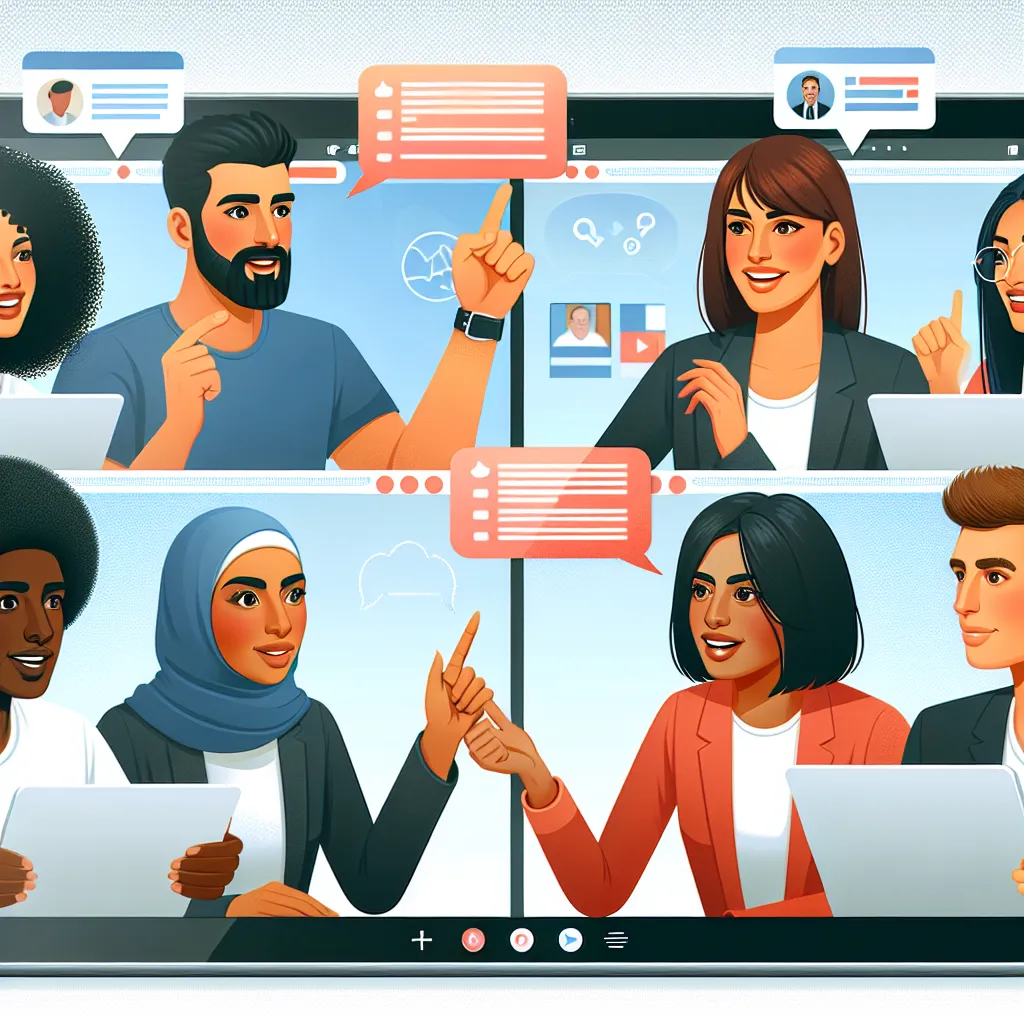Are you looking for an engaging and effective way to enhance your English skills? Online discussion groups offer a fantastic opportunity to practice and refine your language abilities in a dynamic, interactive environment. This guide will explore how you can leverage these digital platforms to significantly boost your English proficiency.
Why Online Discussion Groups Are Effective for English Improvement
Online discussion groups provide a unique blend of casual conversation and structured learning. They allow you to engage with native speakers and fellow learners, exposing you to diverse perspectives and language usage. This immersive experience is crucial for developing natural language skills and cultural understanding.
 English learners in online discussion
English learners in online discussion
Benefits of Participating in Online English Discussion Groups
- Real-time language practice
- Exposure to various accents and dialects
- Opportunity to learn colloquialisms and idiomatic expressions
- Instant feedback from peers and moderators
- Flexibility to participate at your convenience
How to Find the Right Online Discussion Group
Choosing the appropriate discussion group is crucial for your English improvement journey. Consider the following factors:
1. Determine Your English Level and Goals
Before joining a group, assess your current English proficiency and identify your learning objectives. Are you a beginner looking to build basic conversation skills, or an advanced learner aiming to refine your professional English?
2. Research Different Platforms
Explore various platforms that host English discussion groups:
- Language exchange websites (e.g., HelloTalk, Tandem)
- Social media groups (Facebook, LinkedIn)
- Dedicated language learning forums (Reddit’s r/EnglishLearning)
- Video chat platforms (Zoom, Skype)
3. Check Group Demographics
Look for groups that match your interests and language level. Some groups cater to specific professions or hobbies, which can make discussions more engaging and relevant to your needs.
Strategies for Maximizing Your Learning in Online Discussion Groups
Once you’ve found a suitable group, employ these strategies to make the most of your experience:
1. Be an Active Participant
Don’t just lurk! Engage in discussions regularly. Start with simple comments and gradually increase your involvement as your confidence grows.
2. Prepare Topics in Advance
Before joining a discussion, research the topic and prepare some talking points. This preparation will boost your confidence and vocabulary specific to the subject.
3. Use the Chat Feature Wisely
Many online platforms have a chat feature. Use it to ask questions about unfamiliar words or phrases without interrupting the main conversation.
4. Record and Review Sessions
If permitted, record the discussions (with the group’s consent) and review them later. This practice allows you to catch nuances you might have missed and learn from your own contributions.
5. Embrace Mistakes as Learning Opportunities
Don’t be afraid to make errors. Mistakes are an essential part of the learning process. Welcome corrections from others and learn from them.
Common Challenges and How to Overcome Them
1. Overcoming Shyness
Many learners feel nervous about speaking in group settings. Start by participating in text-based discussions and gradually transition to voice or video chats as you become more comfortable.
2. Dealing with Fast-Paced Conversations
If you find it challenging to keep up with rapid discussions, don’t hesitate to ask people to slow down or repeat themselves. Most participants are understanding and willing to accommodate learners.
3. Managing Time Zones
Online groups often include members from various time zones. Use tools like World Time Buddy to find suitable times for participation and set reminders for scheduled discussions.
Advanced Techniques for English Improvement in Discussion Groups
As you become more comfortable with online discussions, try these advanced techniques:
1. Take on Leadership Roles
Volunteer to moderate discussions or lead a topic. This responsibility will push you to prepare thoroughly and improve your language skills.
2. Focus on Specific Language Skills
Use discussions to target particular areas of improvement, such as:
- Practicing phrasal verbs in context
- Enhancing your use of idiomatic expressions
- Refining your pronunciation of challenging sounds
3. Engage in Debates and Argumentative Discussions
Participating in structured debates can significantly improve your ability to articulate complex ideas and construct persuasive arguments in English.
 English learners in online debate
English learners in online debate
Measuring Your Progress
To track your English improvement through online discussions:
- Keep a language journal to note new vocabulary and expressions learned
- Record your speaking at regular intervals to monitor pronunciation and fluency improvements
- Set specific, measurable goals (e.g., learning five new idioms per week) and track your achievement
Conclusion: Embracing Continuous Learning
Online discussion groups offer a powerful tool for improving your English skills. By actively participating, embracing challenges, and consistently applying the strategies outlined in this guide, you can significantly enhance your language proficiency. Remember, language learning is a journey, not a destination. Enjoy the process of continuous improvement and the rich cultural experiences that come with it.
We encourage you to share your experiences with online English discussion groups in the comments below. What strategies have worked best for you? What challenges have you faced, and how did you overcome them? Your insights could be invaluable to fellow English learners embarking on this exciting journey of language improvement.




